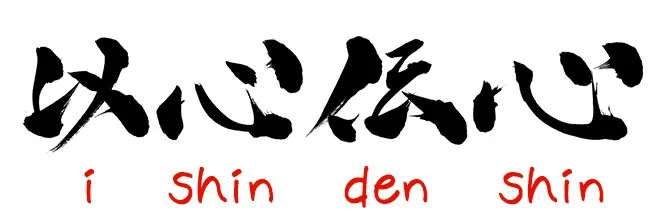Hello peeps! @ailindigo here :)
This is the 32th Untranslatable Word and this time we're going to Asia, specifically to Japan! one of my favorite countries from this side of the world, one that I think has some of the most beautiful and meaningful words in their language. I think this week's word is one that pretty much explains and shows japanese culture's wit and quickness.
This week word is the japanese: ishin-denshin.

Gif by Wordstuck
ishin-denshin
When I found this word I instantly remembered all the times I had moments of this with certain people, I think this is something that on this side of the world doesn't happen as much as in theirs, maybe because of culture differences?
ishin-denshin is an idiom that literally translates as "what the mind thinks, the heart transmits" but also as "from heart to heart", commonly used in East Asian cultures it denotes a form of interpersonal communication through unspoken mutual understanding. *
The Japanese language is considered high-context, which means that verbal communication relies heavily on an implied understanding of situations, and maybe this is why some Japanese believe what this idiom refers to be a unique characteristic of Japanese culture. English language is low-context, we tend to be very direct and explicit with the words we chose to explain something or when asking questions. The high and low context cultures is an idea introduced by anthropologist Edward Hall in the late 1970s that pretty much helps us to understand communication, and even more, japanese communication. *
In this sense, Ishin-denshin is a non-verbal communication that continues to influence aspects of contemporary Japanese culture and ethics, ranging from business practices to end-of-life care. It’s a concept used to explain the tacit understanding many Japanese people have and that some people call a kind of telepathy. There is an assumption that others around you know what you're thinking. While telepathy uses some kind of supernatural power to probe another person's mind, ishin-denshin works on the premise that everybody's on the same page, it refers to a passive form of shared understanding. *
According to Patrick Rault, 8th Okinawa Dan and 7th Dan in France, who immersed himself for 15 years in Japan; "Ishin Denshin means that without talking or writing we can naturally understand each other heart to heart ... I believe that martial arts should be taught by Ishin Denshin. The master should ensure that his students become accustomed to this method in order to develop intuition and the ability to read others ... This implies that the master must purify his own heart (Senshin) and make a great deal of effort with to develop are honest attitude as the disciple is going to be connected to him by observing and feeling rather than listening alone." *

Bartok Design
The introduction of this concept to Japan (via China) is related to the traditions of Zen Buddhism, where the term ishin-denshin refers to direct mind transmission. Zen Buddhism tradition, in turn, draws the concept of ishin-denshin from the first Dharma transmission between Gautama Buddha and Mahākāśyapa in the Flower Sermon. The story goes as following: There were many people reunited and Buddha lifted up a flower in front of all of them and then remained silent, that's all the meetup consisted of, all the content that was transmitted was that, nothing else; all the attendees were astonished, without understanding anything, and only one of them (Mahākāśyapa) did something different from the rest: he smiled subtly; they both exchanged no words, and both understood, through their gaze alone, a profound transforming truth: They had understood that in the smile of silence, in the present moment, here and now, lies enlightenment; always available, in this very moment where you are, in this place where you are right now. *
Now, I think many people including myself have considered japanese culture and language to be one that reflects how much this people are into self-awareness, emotional intelligence and even their relationship with their surroundings, and I think it wouldn't be crazy to come up with even a tight relationship between mind and heart, after all eastern cultures are know for their mindfullness characteristics. Every time I've had an ishin-denshin moment with someone, usually a close friend or partner, I can't help but think this is something entirely based on mental affinity, or that it takes time of getting to know each other, maybe because we're low-context cultures?
I think it's definitely special and it encourages me even more to live in a culture like this, I'd like to experiment myself how this happens in these places in all its different situations and nuances. Though, as this is something I've only found in partners (not always though) and close friends, perhaps I'm wrong and it's the same way there in Asia? I can't tell unless I go there and live it myself; in any case, I think ishin-denshin is indeed a style of communication way more meaningful and deeper than spoken communication.
What do you think? Does ishin-denshin show that aspect of Asian cultures? Please feel free to let me know what you think in the comments!
Thank you very much for passing by! And if you have an Untranslatable Word you'd like to suggest, please don't hesitate to do so! :)
Previous Untranslatable Words:
This content is part of a new series to get more people interested on languages and how they, perception and culture are related!
Exclusively for the Hive Cross Culture Community, the community for language exchange and cross-cultural purposes.
If you'd like to be part of the discussion don't hesitate to hop into the Hive Language and Culture Exchange Discord server! As well as subscribing to the Hive Cross Culture Community so you don't miss any new word comming ;) We'll be sharing a new Untranslatable Word each week!

